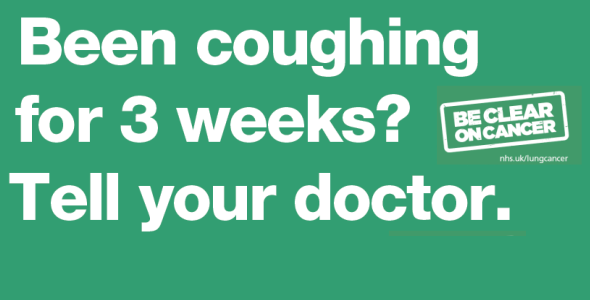Be clear on cancer, never ignore a persistent cough
Tuesday, November 17, 2020

Lung cancer is one of the most common and serious types of cancer. This Lung Cancer Awareness Month, doctors in Sefton are explaining the differences between ‘COVID cough’ and symptoms of lung cancer, to make sure that we are clear on cancer and help to treat cancer early.
At the start of the Covid-19 outbreak, there was a steep drop in the number of patients referred for investigations and appointments for suspected cancer. Since then we’ve seen an improvement in the number of referrals as more people speak to their GP with concerns about signs and symptoms of cancer.
Finding and treating lung cancer at an early stage can save lives.
Dr Debbie Harvey, Macmillan GP and cancer clinical lead at NHS South Sefton Clinical Commissioning Group (CCG) said: "There are often no signs or symptoms of lung cancer in the early stages, but earlier detection can save lives so don’t delay getting the help you need. You should speak to your GP if you have a new persistent cough for over 3 weeks, or are coughing up blood, or have new breathlessness, or unexplained tiredness or weight loss, or an ache or pain when breathing or coughing. These symptoms do not mean you definitely have cancer but do need to be checked.
"We know that a persistent cough is also a common symptom of COVID-19, but the other symptoms are generally not connected to Coronavirus. If you’ve got a history of smoking, including passive smoking, or been exposed to certain chemicals and substances like asbestos that are known to increase your risk of lung cancer it’s especially important to get the above symptoms checked."
If you have a new, persistent cough or one of the other coronavirus symptoms – a high temperature or a change or loss in your sense of taste or smell – you and everyone in your household and support bubble should self-isolate. Book a Coronavirus test as soon as possible online or call 119. If you are unwell with possible COVID advice and support is available by calling 111 or your GP practice.
Dr Graeme Allan, Macmillan GP and cancer clinical lead at NHS Southport and Formby CCG said:
"Understandably, many people are anxious about attending face-to-face assessments or treatments at the moment due to the pandemic. We would like to reassure people that extra measures have been put in place to keep patients and staff safe.
"Although Coronavirus has changed the way that GP practices work, your GP is still there for you. Your practice may arrange a call or video consultation in the first instance and will see you face-to-face in a safe way if necessary.
"If you are asked to come into your GP practice, it’s really important that you attend – unless you have symptoms of COVID-19 or are self-isolating."
Useful links:





